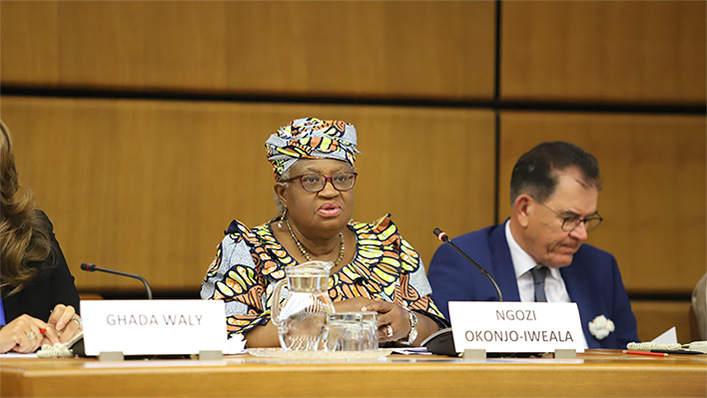
In remarks delivered at the opening of “World Cotton Day 2023” hosted by the United Nations Industrial Development Organization (UNIDO) in Vienna, the Director-General admitted that 20 years of negotiations at the WTO on the trade aspects of cotton have failed to reach their final and main result.
“There is no point sugar-coating things: over the past 20 years, WTO members have not made progress on cotton in the context of the negotiations on agriculture,” she said. “Persistent distortions in international markets impede the fair participation of many cotton-producing countries. This is a collective failure, one there is no running away from. But we won’t give up trying to get the right outcomes for cotton producers in our negotiations.”
“The coming weeks offer a short window of opportunity for our members to define and pursue what they consider to be an appropriate cotton outcome at MC13,” DG Okonjo-Iweala added. “I call on members, and particularly the C-4 (Cotton-4), to engage with each other to explore possible landing zones … and define the contours of a possible MC13 outcome on cotton.”
MC13 will take place from 26 to 29 February in Abu Dhabi, United Arab Emirates.
Cotton is discussed at the WTO under two complementary tracks: trade aspects, involving multilateral negotiations to address distorting subsidies and trade barriers for cotton; and development assistance provided to cotton production and its value chain.
The talks are the result of the “Sectoral Initiative on Cotton” from the C-4 – Benin, Burkina Faso, Chad and Mali (subsequently joined by Côte d’Ivoire) – establishing cotton as a priority on the multilateral trading system’s agenda.
World Cotton Day (WCD) was launched at WTO headquarters in 2019 at the request of the C-4 to recognize and celebrate the importance of cotton as a global commodity and to raise the profile of their cotton-specific needs on trade and development. In September 2021, WCD became the official UN International Day of Cotton.
“Making cotton fair and sustainable for all, from farm to fashion” was the theme of this year’s event at UNIDO, which was supported by the WTO, the UN Food and Agriculture Organization, the International Trade Centre, the International Atomic Energy Agency, and the International Cotton Advisory Committee (ICAC).
DG Okonjo-Iweala said the theme of WCD 2023 “is an imperative for us all, given the sector’s importance for the livelihoods of millions of people worldwide. The stakes are especially high in some of the world’s poorest countries, where incomes related to cotton can make the difference between extreme poverty and undernourishment or a better life.”
“The road to getting there is long and will require a lot of work from all actors here today,” she said, noting that C-4 and other least developed country (LDC) cotton producers are grappling with challenges that include price volatility, market distortions, the impacts of climate change, pest problems and other downstream challenges.
In a keynote address, Wanledom Robertine, Chad’s Minister of Trade and Industry and coordinator for the C-4, said cotton represents around 12 per cent of gross domestic product and 40 per cent of total export receipts for African countries and LDCs who are exporters of cotton. However, the COVID-19 pandemic has devastated the African cotton sector, helping to fuel the rural exodus and migrant crisis which the world is witnessing today, she said.
“We need a significant response allowing us to deal with the current challenges linked to productivity and cotton processing in Africa,” she declared. “What is crucial is to develop the value chain of cotton and capitalize on the different segments in it so that our people can benefit in terms of job creation and structural development.”
ICAC Executive Director Eric Trachtenberg noted that the global cotton sector is valued at US$ 50 billion, with US$ 20 billion in global trade. Cotton sustains 20 million growers and benefits 100 million people along the value chain.
The sector is currently witnessing flat to declining yields because of climate change and other weather effects, Mr Trachtenberg noted, making it even more important to transition to sustainable and climate resilient production.
In response, DG Okonjo-Iweala noted that the WTO has been actively responding to the demands of the C-4 countries and their partners for support to scale up production, diversify their output, and add value to cotton and its by-products.
“With our partners, including all the international organisations represented here today, we are working actively to mobilize financial and technical resources to accompany LDCs’ efforts, led by the C-4, to further develop the sector and the value chains associated with it,” she added. “My hope is that this World Cotton Day will serve as a key platform to coordinate our efforts towards delivering real improvements in the lives of cotton producers and traders in the not-too-distant future.”
More information on World Cotton Day is available here.
WTO-UNIDO panel on sustainability and innovation
The WTO joined UNIDO at WCD 2023 to organize a panel discussion on sustainability and innovation at WCD 2023 under the theme: “Balancing Innovation and Regulation for Enhanced Cotton Quality, Yields and Sustainability in Cotton-to-Textile Value Chains.” Representatives from the Better Cotton Initiative, the FMC Corporation, the Tessellation Group and Arise IIP addressed issues such as sustainability certification, improving cotton yields and fibre quality, and potential innovations for sustainable fabric and textile production with the aim of advancing sustainability and innovation in the cotton-to-textile industry.
More details on the WTO-UNIDO panel event are available here.
Share
Reach us to explore global export and import deals